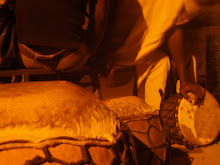Growing up, my mom told me I was special. In some ways, I now that's true, but in some ways I'm still just your normal middle-class white girl. And then I came to
While I'm sure I've changed during my year in Africa, for the most part I'm the same girl I've always been, it's how I'm perceived that's changed so drastically. See, in
Let's start with my family connections:
In my village I have a host family that I spend time with every day, primarily mealtime, even though I have my own house. The patriarch of this family is the acting 'dugutigi' of Dramétou, which literally means 'village owner' but is essentially the chief. So, my dad is an African chief which makes me and African princess!
For those of you familiar with Malian custom, I also have a significant family name. I'm a Kanté, which makes me a blacksmith, which is by far the best group in
Next we'll address my appearance:
I am a pale Caucasian. Unfortunately, this makes it rather difficult to blend in visually and also causes most people to assume I am rich and speak French. Neither of these assumptions is correct, but the former results in automatic attention that goes beyond noticing the color of my skin. (Just imagine what they would think if I *gasp* showed my knees which haven't seen the sun since my arrival in
This attention I receive can be obnoxious or great depending on the person. If it is a street beggar - obnoxious. If it is some random guy I've never met before that wants to marry me on the chance that I will take him back to whatever rich country I came from or just to show me off to all his friends - obnoxious. If it is a non-beggar who nonetheless thinks I want to throw away my (non-existent) riches on them and has no problem asking me for it - once again, obnoxious. Lest you start to identify a negative pattern here, I will now tell you that, despite the aforementioned annoyance, and the children who chant 'tubabu, tubabu' (white person, white person), being this 'tubob' has its advantages. It also causes me to be the recipient of friendly advances, largely unearned respect, and grins and waves from children (sometimes the same ones who chant).
Finally, there's my gender to consider:
I am female, and, when combined with my white skin, that opens a lot of doors. My site mate and I have identified what we refer to as the 'vagina discount.' Even though he gets the preferential treatment of a white person, I tend to be even more popular. I've gotten free stuff in shops, been bumped to the front of lines, and received lowered prices. Now, some women may be used to this, but I am not, nor have I done anything remotely resembling flirting in order to obtain these advantages. You may be thinking, okay, so that's nice and all, but aren't women in
These 3 factors are things completely out of my control, and in some ways I am ashamed of them. My cultural upbringing has taught me to believe in what I am capable of achieving regardless of who I happen to be. However, the things I have achieved have brought me where I am (that's
So - when I come back to the states for a visit or for good, please be patient with my inflated ego.
*This is all just part of the 'joking cousins' aspect of Malian culture. People regularly refer to other ethnic groups as donkeys, bean-eaters, and slaves, but it truly is all in good fun and even a good way to diffuse a tense situation with laughter.
**GAD (Gender and Development) is just getting off the ground here in Mali as an effort to empower women and other disadvantaged populations. Thank you Caroline and Amber!
